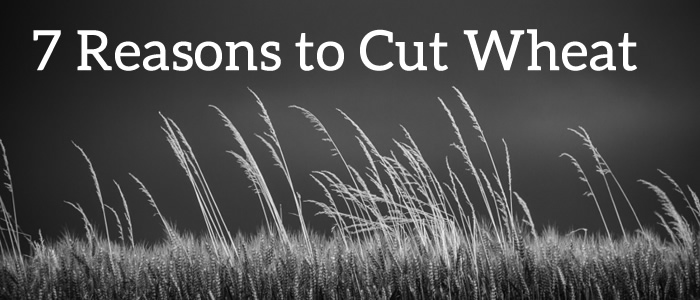7 Benefits of Cutting Wheat from Your Diet
Could cutting wheat from your diet unlock your health & energy?
For decades we have been told that we should be eating 2-3 serves of whole grains every day.
We’ve been told it’s healthy and an integral part of a balanced diet.
But what if it’s not true?
What if the supposed benefits of grains were not only false, but if the consumption of grains was the driving force behind almost all of the chronic conditions people are suffering from?
There is irrefutable scientific evidence to suggest that grains cause inflammation, insulin resistance, type 2 diabetes, brain conditions such as depression and Alzheimer’s, IBS and chronic digestive issues, fatigue conditions such as Fibromyalgia, skin conditions and more.
So why have we been continually told to keep on eating it 3 times a day?
Why is it the largest part of the food pyramid?
Why do whole grain products get the tick of approval from health bodies?
For 14-days I challenge you to put all preconceptions about grains aside and try a grain-free fortnight.
Here are just seven of the benefits you might experience.
Do You Want My Free Anti-Inflammation Training?
I am running free online training (webinar) to show you exactly how to beat inflammation, naturally.
Click here to find out more and register your space – this training will give you the plan you need and the confidence to make it happen!

The Seven Benefits of Cutting Wheat From Your Diet:

1. Reduced Belly Fat
Wheat and grains spike blood sugar like nothing else – more than eating a chocolate bar, drinking a soda, eating a cake or sneaking a cookie [1].
Why? Wheat contains a “super carbohydrate” called amylopectin A – and this carb drives your blood sugar very high, very, very quickly.
Remember, if you’re on anything like a standard Western diet, 70% of your food consumption either is grain based – and therefore you’re consuming a LOT of amylopectin A.
When there is high blood sugar, insulin is released by the pancreas, and the higher the blood sugar the more insulin must be released.
In this study from the American Journal of Clinical Nutrition, participants were given a diet of 70% amylose or 70% amylopectin. Those on the amylopectin diet had higher glucose and insulin responses after a meal [2] – not good.
If you trigger high blood sugars repeatedly, the accompanying overproduction of insulin will lead to huge and rapid production of visceral fat accumulating around your abdomen (this has it’s own, related fatigue effect which we will get onto in a few minutes).
And the bigger your belly (i.e. the more visceral fat), the poorer your response to insulin, and the result is that higher and higher insulin levels are demanded, creating a vicious cycle.
Remember, nothing provokes high blood sugar like wheat.
This is when things start to get really bad. When visceral fat accumulates, the flood of inflammatory signals it produces causes the body to respond much less effectively to insulin. [3]
This so-called insulin resistance means that the pancreas must produce even more insulin to metabolize high blood sugar.
Eventually, a vicious circle of high blood sugar increased insulin resistance, increased insulin production, increased visceral fat, leading to more increased insulin resistance, more visceral fat, more insulin production…and so on…leaving you fat, sick and chronically fatigued.
When we get into this cycle, starting with the consumption of wheat (and the amylopectin A) that causes the high blood sugar, we ultimately lose the ability to access our body’s biggest source of energy – fat.
Remember, fat is our biggest source of energy and high insulin levels remove our ability to burn body fat.
When you eat mostly wheat and grains (as we’ve been told to by our government, food pyramid and ‘healthy’ authorities), your body becomes resistant to insulin’s effects and so more and more has to be created with each whole wheat sandwich, bowl of pasta, serve of rice and so on.
The sheer volume of insulin eventually damages the pancreas and leads to even greater volumes of visceral body fat and the cycle continues, leaving you with chronic fatigue and a host of inflammation-based illnesses [4].
This blood sugar DROP is the instant hormonal reaction that gives you the sudden feelings of fatigue and the need for sleep, alongside the irresistible hunger as the body tries to protect you from the dangers of low blood sugar.
…which then leads to a craving for more grains and carbs to spike that blood sugar up again…!
2. More Energy
In my research I have found that there are FOUR ways that grain consumption causes fatigue:
1) Hormonal Fatigue: when we consume wheat and that pesky super-carb Amylopectin A, we spike our blood sugar levels significantly, leading to rapid insulin release. With the body trying to now process more insulin than it can handle, we develop insulin resistance…which means that the next time you eat wheat – you release even more insulin and so it continues.
Repeated insulin resistance leads to your body to accumulate visceral fat. This has its own energy-sapping consequences, but more instantly, it damages the pancreas and over time?
The hormone insulin removes our ability to access our body’s primary source of energy – body fat.
Eat gluten-containing grains and you will not only GAIN fat but lose your ability to burn it!
2) Malnourishment Fatigue: as mentioned above, when we continually consume gluten-containing grains, we not only clog our digestive system and destroy those microvilli that are responsible for nutrient absorption and processing, but the anti-nutrients in gluten also ROB you of essential minerals that you NEED to process and create energy!
If you ate NO healthy foods, you’d expect to be low in energy. And gluten basically guarantees that no matter what you eat your body will be getting none of the benefit, either way.
3) Mental Fatigue: when you digest wheat, the wheat is exposed to pepsin (a stomach enzyme) and hydrochloric acid (stomach acid produced to digest it), and the gluten in the wheat is degraded to a mix of polypeptides.
These polypeptides are shown to be able to cross the blood-brain barrier that separates the bloodstream from the brain.
Once having gained entry into the brain, wheat polypeptides bind to the brains morphine receptor, the very same receptor that opiate drugs bind to.
These polypeptides have been labeled ‘exorphins’ – short for exogenous morphine-like compounds and this is what creates the mini-high followed by the mood and energy slump right after.
Repeated exposure to these exomorphins (the dominant of which has been named gluteomorphin) leads to a serious imbalance in the brain and has been proven to lead to a far higher likelihood of depression and schizophrenia.
At the very minimum, it immediately creates foggy thinking, daytime fatigue, and physical sluggishness.
4) Acidity Fatigue: You’re on my alkaline diet site, so you knew that pH was going to come up at some point, right?
For those of you who are new to my stuff, here’s a quick intro:
The body HAS to maintain a pH of 7.365 in the blood and other extracellular fluids – if it deviates from this even slightly we die. This is why the body will ALWAYS do EVERYTHING it takes to maintain this pH of 7.365 (the same as it regulates your body temperature – a process known as homeostasis).
A misconception of the alkaline diet is that the aim of the diet is to make this pH more alkaline. It’s not. That would kill you. And that would be counterproductive.
The aim of the alkaline diet is to support the body to maintain this pH level – because the damage to the body is done when it has to constantly compromise everything to keep maintaining this pH [5].
The body has a limited acid-buffering capacity while maintaining normal function and the repeated requirement to maintain this pH causes a huge array of knock-on problems – and that an alkaline diet can remedy these problems – from digestive issues, inflammation, candida/yeast overgrowth, bone weakening [6], arthritis [7], gout [8] to more serious issues.
And fatigue is one of the most common, and rapidly experienced consequences of an acidic diet…
And wheat and grains are two of the most clogging, acidic foods by far.
When we have excess acidity the body isn’t able to buffer all of the acids and the acid by-products (such as yeast/candida) and so it stores the toxins away wherever it can, binding them in visceral fat to protect vital organs.
The digestive system then becomes clogged as the wheat consumed quickly turns into sugar which further fuels the acidic waste growth inside the digestive system, creating more visceral fat.
On top of this, the excess visceral fat created by the blood sugar/insulin response leads to extra inflammation and so the body becomes even more compromised in its ability to burn fat, remove wastes and with the clogged digestive system – absorb the nutrients it needs to repair.
When the body becomes THIS out of balance, it takes all of the energy it can muster, just to keep you processing, metabolizing and ultimately, alive.
The inflammation that comes from an acidic diet, fuelled by wheat (which metabolizes to sugar, the most acidic substance to the body you can imagine), causes huge disruption with the immune system, leaving you vulnerable to all manner of conditions.
We all have the energy within us to thrive, but when the diet is predominantly wheat and gluten based, this energy is robbed by the toxic environment it creates, leaving you fat, tired and sick.
You become fat from the rapid visceral fat production (and the out-of-whack insulin production that prevents fat being used to create energy), tired from the lack of nutrients being absorbed from the digestive system and your energy being used entirely just to keep you functioning in this highly toxic state, and sick from the incredible amount of inflammation that suppresses your immune system and prevents it from properly protecting you.
3. More Nutrient Absorption
How would you feel if I told you that you might not be getting the nourishment from the foods you work so hard to get into your diet.
Yep, that salad you just ate, or the juice you took the time to make could only actually be delivering a tiny fraction of the benefit to you – and all because of gluten.
There are two very specific and powerful ways that gluten and wheat consumption inhibit the absorption of the nutrients you consume.
- Destroying the ‘Nutrient Consumption’ Stage of Digestion:
When you consume grains and they reach your intestines, the gluten in the grains is broken down into its two proteins, gliadin and glutenin by an enzyme called transglutaminase (tTG).
As these proteins make their way through your digestive system your gut identifies gliadin as a dangerous substance and produces antibodies to attack it.
Your body absorbs nutrients from foods to provide you with energy through tiny finger-like growths in the intestines called microvilli.
And these antibodies produced by the tTG destroy and erode these microvilli, meaning that a tiny proportion of the nutrients you’re consuming are being absorbed. [9]
And with no nutrient absorbtion, you get the root cause of chronic fatigue. Day after day.
- Gluten Contains ANTI-NUTRIENTS that Rob Your Body of Nourishment:
To make this worse, grains also contain the ANTI-NUTRIENTS phytic acid and lectins.
Firstly, phytic acid binds minerals in the digestive tract making them much less bioavailable (absorbable) to the body.
They are mineral blockers that prevent absorption of calcium, magnesium, iron, copper and zinc and all of the other alkaline minerals you need for great health and energy.
And lectins?
These are proteins that simply cannot be digested. They pass through the wall of our gut undigested damaging the gut, causing inflammation and over-stimulating our immune system to the point where damage occurs, the immune system is imbalanced and fatigue sets in.
When you eat a lot of grains, you get a blocked and compromised digestive system.
The lectins in modern grains (especially wheat, but also rye, spelt, etc) cause huge inflammation and clogging in the small intestine. This matters, because the small intestine is the organ that extracts nutrients from the food we eat.
When it gets inflamed and clogged by foods such as grains, the microvilli are damaged beyond belief, or worse, get hidden and covered with the undigested matter.
The result of either is that they cannot do their job – and so you digest a fraction of the nutrients you consume.
4. Better Digestion
We’ve been sold the fuzzy logic that wheat and especially whole-wheat or whole-grain foods are great for our digestive system – because they contain fiber.
The reality is, this is a wolf in lambs clothing.
It’s the equivalent to saying blueberry muffins are good for you because the blueberries contain antioxidants.
Or that eating a tub of ice-cream is healthy because it contains calcium.
When gluten from grains is consumed (and this is the case for 90% of people who eat grains and gluten 3-4 times per day), the digestive system becomes seriously compromised. Fast.
Wheat & grains stress the digestive system in three ways:
1: Firstly when grains are consumed, the two proteins in gluten (gliadin and glutenin) are broken down. As they make their way through the intestine the gut identified gliadin as a dangerous substance and produces antibodies to attack it.
These antibodies erode and destroy the microvilli in the small intestine that are there to absorb nutrients
2: PLUS the microvilli that remain are then covered in the acidic wastes that come from the breaking down of grains and gluten and the intestine becomes impacted with yeast, candida, bacteria, and undigested matter – compacting the remaining microvilli – further preventing absorption of nutrients.
3: Finally, repeated exposure to grains (and their gliadins and lectins) causes holes to emerge in the intestinal wall (known as leaky gut) which allows undigested matter, bacterias and more to enter the bloodstream
The immediate effect of this is chronic inflammation and fatigue.All health starts in the gut, and eating wheat absolutely destroys it. In fact, studies have linked gluten directly with IBS and other digestive complaints. [10 , 11, 12]
If you’re struggling with gut issues right now, I challenge you to start cutting wheat and give up gluten for 14 days and see the difference.
5. Heart Health
Here’s where the Amylopectin A rears it’s ugly head again.
Science is now beginning to realize and confirm that limiting cholesterol is UNhealthy (a change in approach here from the Dietary Guidelines Advisory Committee).
But there is one type of cholesterol closely linked to heart health – small dense LDL particles.
A study published in the Journal of the American Medical Association showed that people with high levels of small dense LDL have a 300% greater risk of heart attack [12a]!
And guess what triggers these dangerous compounds to form more than any other food?
It is the amylopectin A found in wheat!
The body rapidly converts Amylopectin A into triglyceride-containing particles like very low-density lipoproteins, or VLDL.
Think of triglycerides in VLDL as the first domino: Once there are excess triglycerides as VLDL particles, they interact with other blood particles, especially LDL particles, in turn enriching LDL particles with triglycerides.
This leads to a series of reactions in the bloodstream that cause the formation of small LDL particles.
When there is insulin resistance (as caused by the repeated consumption of wheat) the problem is worse [13]
If you want to look after your heart, you may want to skip past the grain-industry-funded heart safe ticks and approvals on loaves of bread and go for real, natural, whole foods instead.
6. Improved Mood
With everything covered so far about the damaging effects of gluten on your gut, I expect you’ll be interested to know that 90% of the body’s serotonin (responsible for mood elevation, and control of aggression and depression) and almost 50% of the body’s dopamine (responsible for motivation and attention) is generated in the gut.
So if your gut is being damaged by this gluten consumption to the degree that we have read above (which is all researched and proven, as you’ve seen), then what do you think this might do to your mood, mental energy, and motivation?
In fact, a number of studies indicate that wheat can have a detrimental effect on mood, promoting depression and even more serious mental health problems such as schizophrenia [14].
The intestinal damage wrought by gluten consumption prevents absorption of essential nutrients (see point 3 above) that keep the brain healthy, especially zinc, tryptophan, and the B vitamins.
In particular, low zinc levels have been linked to depression.
In addition to keeping the immune system strong and the memory sharp, zinc plays an important role in the production and use of neurotransmitters-brain chemicals that help regulate mood. This is why low levels of zinc have been linked to major depression, and why supplemental zinc enhances the effects of antidepressant medications in many people. A 2009 study found that zinc supplementation significantly reduced depression scores in people who had not been helped by antidepressants in the past [15].
7. Reduced Inflammation
Cutting gluten from your diet is the fastest way to reduce inflammation.
If you’re experiencing any niggling health issues, things like fatigue, excess weight, skin conditions, reflux, IBS or more, it’s highly likely that inflammation, that you don’t even know is happening, is the cause.
Research has found direct links between chronic inflammation and a whole host of conditions and diseases, from skin conditions, allergies and fatigue all the way through to Alzheimer’s, diabetes and heart disease.
And grain consumption has been proven to be pro-inflammatory [16], especially in the intestine [17]
As discussed, it’s not just the inflammation caused by digesting the grain itself, but the knock-on effect of:
- The rapid formation of visceral fat from the increased insulin production which in itself leads to inflammation
- The inflammation caused by the overstimulated immune response to the increase in insulin production and digestive damage
And to make matters worse, two of the other worst foods for inflammation – trans fats and sugar, are very frequently found in foods containing wheat and gluten!
If you want to reduce inflammation in your body, try cutting wheat. It’s as simple as that.
The Effects of Gluten & Grain Are Far Reaching – Just Cutting Wheat From Your Diet Could Do You Wonders!
As you can probably tell from reading these seven benefits of cutting wheat – the effects of grain consumption all have a knock on effect to each other, and then further fuel each other. The insulin spike causing weight gain which causes inflammation, which leads to immune response, which leads to further inflammation and so on is just one example of just one vicious cycle you get into when you regularly consume wheat.
Not to mention the energy loss, the candida overgrowth, the mood and mental issues, the over-acidity and more.
If you’re serious about getting the energy and health of your dreams, and the body you deserve, I strongly urge you to start cutting wheat out and give a gluten-free life a try!
And a Note on Gluten-Free Products
While it’s great to cut back or eliminate grains from your diet, there are a LOT of gluten-free packaged goods that are just as bad, if not worse.
Don’t be tempted into thinking a muffin or cookie or cake is healthy because it doesn’t contain gluten. If it isn’t healthy WITH gluten, it’s probably not healthy without it either.
Still, see these types of foods as a treat, and try to keep them to a minimum. Being gluten-free isn’t a license to eat with wild abandon!
And a Final Note: this isn’t just for those with Celiac Disease
Reducing gluten is not just for people diagnosed with Celiac Disease (CD). Research published in BMC Medicine shows that there are many expressions of the immune response to gluten that can impact the body in very different ways to just those noted in CD patients. People can most certainly be gluten-sensitive without having celiac disease or gluten antibodies and still have inflammation and many other symptoms. [18]
Scientific Research & References
1. International table of glycemic index and glycemic load
values: 2002; Kaye Foster-Powell, Susanna HA Holt, and Janette C Brand-Miller; Am J Clin Nutr January 2002 vol. 76 no. 1 5-562. Diets containing high amylose vs amylopectin starch: effects on metabolic variables in human subjects; Kay M Behall, DanielJ Scholfield, Irene Yuhaniak, and John Canary; Am JC/in Nutr 1989;49:337-44.
3. Gluten-free diet reduces adiposity, inflammation and insulin resistance associated with the induction of PPAR-alpha and PPAR-gamma expression; Fabíola Lacerda Pires Soares et al; The Journal of Nutritional Biochemistry
Volume 24, Issue 6, June 2013, Pages 1105–11114. The Dietary Intake of Wheat and other Cereal Grains and Their Role in Inflammation; Karin de Punder and Leo Pruimboom; Nutrients 2013, 5(3), 771-787;
5. Diet, evolution and aging–the pathophysiologic effects of the post-agricultural inversion of the potassium-to-sodium and base-to-chloride ratios in the human diet. Frassetto L, Morris RC Jr, Sellmeyer DE, Todd K, Sebastian A. Eur J Nutr. 2001 Oct;40(5):200-13.
6. Treatment with Potassium Bicarbonate Lowers Calcium Excretion and Bone Resorption in Older Men and Women; Bess Dawson-Hughes, Susan S. Harris, Nancy J. Palermo, Carmen Castaneda-Sceppa, Helen M. Rasmussen, and Gerard E. Dallal; J Clin Endocrinol Metab. 2009 Jan; 94(1): 96–102.
7. Alkaline Mineral Supplementation Decreases Pain in Rheumatoid Arthritis Patients; Regina Maria Cseuz, Istvan Barna, Tamas Bender, and Jürgen Vormann; The Open Nutrition Journal, 2008, 2, 100-105
8. Effect of urine pH changed by dietary intervention on uric acid clearance mechanism of pH-dependent excretion of urinary uric acid; Aya Kanbara, Yoshisuke Miura, Hideyuki Hyogo, Kazuaki Chayama and Issei Seyama; Nutrition Journal 2012, 11:39;
9. Are Genetically Modified Foods a Gut-Wrenching Combination; Jeffrey M. Smith; Institute for Responsible Technology
November, 201310. Irritable bowel syndrome in the United States: prevalence, symptom patterns and impact. Hungin AP, Chang L, Locke GR, Dennis EH, Barghout V. Aliment Pharmacol Ther. 2005 Jun 1;21(11):1365-75.
11. Celiac disease–like abnormalities in a subgroup of patients with irritable bowel syndrome; Ulrich Wahnschaffe, R. Ullrich, E.O. Riecken, J.D. Schulzke; Gastroenterology. Volume 121, Issue 6, December 2001, Pages 1329–1338
12. Can gluten contribute to irritable bowel syndrome? Verdu EF.; Am J Gastroenterol. 2011 Mar;106(3):516-8.
13. The small, dense LDL phenotype and the risk of coronary heart disease: epidemiology, patho-physiology and therapeutic aspects. Lamarche B, Lemieux I, Després JP. Diabetes Metab. 1999 Sep;25(3):199-211.
14. Relapsed Schizophrenics: More Rapid Improvement on a Milk- and Cereal-free Diet; F. C. DOHAN, J. C. GRASBERGER, F. M. LOWELL, H. T. JOHNSTON, ANN W. ARBEGAST; BJP Vol 115 Issue 522;
15. Zinc supplementation augments efficacy of imipramine in treatment resistant patients: a double blind, placebo-controlled study. Siwek M, Dudek D, Paul IA, Sowa-Kućma M, Zieba A, Popik P, Pilc A, Nowak G. J Affect Disord. 2009 Nov;118(1-3):187-95
16. Whole and Refined Grain Intakes Are Related to Inflammatory Protein Concentrations in Human Plasma; Rachel C. Masters; J Nutr. 2010 Mar; 140(3): 587–594.
17. Gluten-induced mucosal changes in subjects without overt small-bowel disease. Doherty M, Barry RE.; Lancet. 1981 Mar 7;1(8219):517-20.
18. Divergence of gut permeability and mucosal immune gene expression in two gluten-associated conditions: celiac disease and gluten sensitivity. Sapone A; BMC Med. 2011 Mar 9;9:23.






Hi Ross
(Inflammatory) cluster headaches too. I’m a chronic sufferer, and am 3 days in, addressing this by being wheat-free, but am in difficult withdrawal, mainly severe lightheadedness. I’ve still had (a small amount of) rye, which seems to trigger the wheat allergy/intolerance, spelt (that appears fine), as do oats, and gluten-free grains. I can feel the dramatic drop in inflammation, weight loss, and I feel much lighter.
Thanks!
Jacquie
When you say, eliminate grains, what type of food are you referring to? Do you include beans?
A very informative article in easy to understand language . I have immensely liked it.
Does reducing wheat help or does the smallest amount of wheat trigger symptoms thank you
This is an excellent article. Thank you. I am 2.5 days into a grain free diet and am noticing significant health benefits. I have tried this before without really noticing much benefit. My aim is to go 7 days and reassess. My question is: For those that love a good pizza or pasta, if I had a pizza on Sunday how approximately many days would it take for me to undo the damage of that one serving? Another way to ask is, can I still stuff my face with pepperoni pizza once a week or is it just not worth it?
What about the green powdered drink..”Just Barley” Is this good for greens?
And what about Sprouted grain breads and tortillas? like Ezekial and Manna breads?
Hi Lynn
Green powdered drinks are great. Sprouted barley grass and wheatgrass contain no gluten. Those breads are good too – sprouted anything is great!
Just look out because some sprouted bread brands add a bunch of additives – go for one that is as natural as possible.
Ross
What about the drugstore fiber made with dextrin. Is that ok?
Hi Ross I have been following your articles for a while ,i live in Barbardos and yes we do have health shop ,I cook brown rice the best uncle ben ,when we are out of stock i have to get it from the u s ,not easy .I use oats not every day .When i go shopping all i see is bread , cakes and i am at lost at what to eat .At lunch i have my Starch Vegetable protein , on morning my fruits .the rest of the day i am at lost what to eat .Please help I am 62 .
Hey Barbara
Keep your eyes out – I’ll be doing a gluten free guide soon to help with this exact issue.
Ross
Hi Ross
I´ve been following you for a while and have to admit that since i’ve been eating more alkaline as you suggest my health and digestive system has iproved quite lot! Thanks for that! 🙂
Nevertheless, I have a confussion about grains… When you mention in different articles about how bad these are for the gut and digestive system, Is not clear for me which grains especifically are you talkig about… I understand wheat in banned, but what about brown rice, broun oat meal, quinoa, amaranth, beans, lentils… etc.
I would really appreciate if you can give me a light with this topic!
Thank you!
Hi Ana
Wheat, barley, rye, spelt etc are out – the foods you mentioned: brown rice, oats, quinoa, amaranth are all good and fine to eat.
Thanks
Ross
HI
I have been a constant reader of your articles on alkaline diet and have been practicing it for some time. . Still i had problem of chronic fatigue and irritable bowl movement. For the last two weeks i have stopped eating all dairy products and all wheat products. Now i am amazed to experience an increased level of energy and and improved mood elevation. Today i read your article on gluten free diet and i would like to share my experience with all your readers.Thank you for your good article.
Thanks 🙂